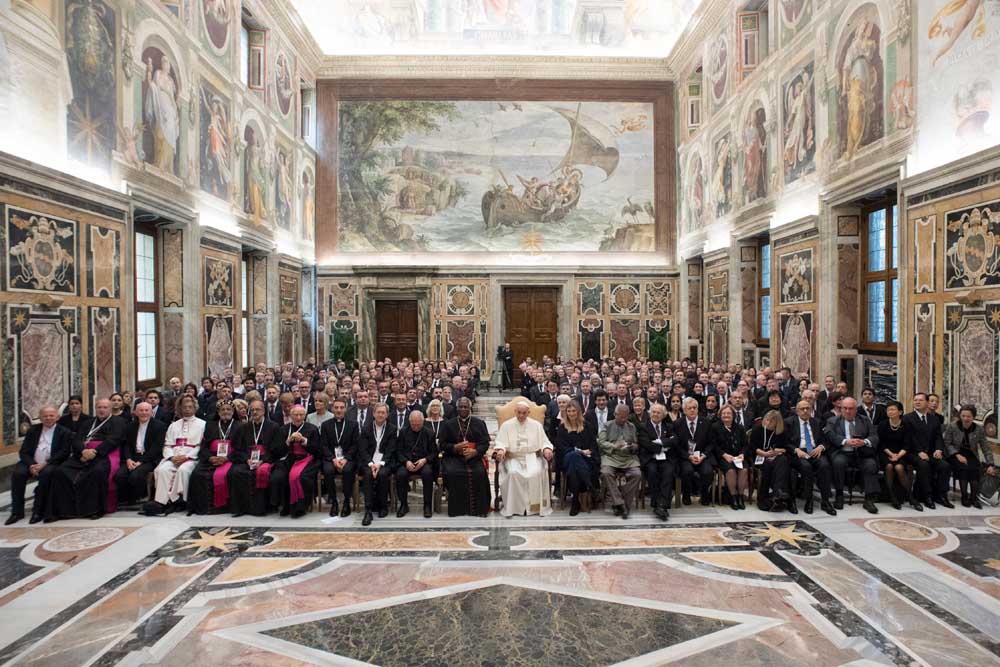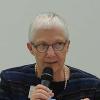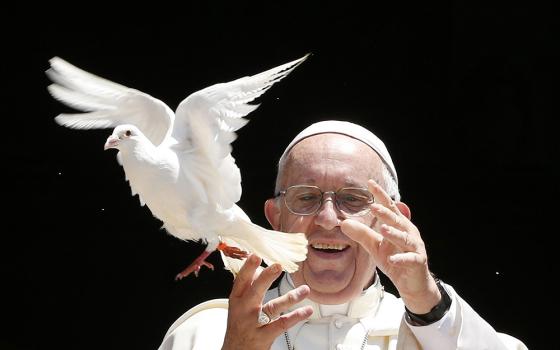
Pope Francis poses for a photo with people attending a conference on building a world free of nuclear weapons, at the Vatican Nov. 10. The conference brought together 11 Nobel laureates, top officials from the United Nations and NATO, diplomats from around the world, experts in nuclear weapons and the disarmament process, scholars, activists and representatives of bishops' conferences. (CNS/L'Osservatore Romano)
Shortly after participants in the recent Vatican symposium on nuclear disarmament heard Pope Francis definitively condemn the "very possession" of nuclear weapons, San Diego Bishop Robert McElroy said: "The church is in the midst of a fundamental reappraisal of how to balance the Christian obligation to nonviolence with the need to resist evil in the world."
Speaking on a panel about the role of the church in promoting integral disarmament and the abolition of nuclear weapons, he continued: "The church must be a voice in the world constantly pointing humanity toward the path of nonviolence and the logic of peace. Too often, we acquiesce in the tolerance of weapons, threats and war, concluding that the logic of war can at least hold evil at bay. But ultimately, it is the logic of war which, once unleashed, invites evil into the core of our world, our nation, [and] our hearts."
The church's clear rejection of nuclear weapons may well be the cutting edge of a groundbreaking shift in Catholic dialogue with the world on issues of war and peace, calling us collectively to conversion, as McElroy said, from "reliance on weapons of war to the construction of weapons of peace. ... The power of nonviolence, once relegated to the category of romantic idealism, has emerged as a potent force for social transformation and the building of lasting peace."
Panelists during the Vatican symposium on "Perspectives for a World Free from Nuclear Weapons and for Integral Disarmament," which brought together members of the Catholic hierarchy, diplomats, politicians, civil society leaders, religious communities, students, theologians and other Catholic leaders, repeatedly called for the abolition of nuclear weapons. Jesuit Fr. Drew Christiansen said it clearly: "We should cease to imagine nuclear weapons as tools for us to manage, but rather as a curse we must banish."
Beatrice Fihn, executive director of the International Campaign to Abolish Nuclear Weapons, recipient of the 2017 Nobel Peace Prize, captured the determined atmosphere of the gathering. Humans, she said, "harnessed the power of science to build these weapons; we have harnessed the power of faith the stop them."
Masako Wada of Nagasaki reminded us why — sharing her mother's description of wounded survivors, their bodies blackened by the blast of the bomb, as they came over the hill near her home a few kilometers from ground zero and of the open-field crematorium next door that overwhelmed and deadened their senses. "What is human dignity?" asked Wada, a hibakusha (a survivor of the U.S. atomic bombings of Nagasaki and Hiroshima).
In fact, the Holy See's position on nuclear weapons has evolved in extremely important ways in the past few years, a process that in many ways culminated during the papal audience with symposium participants when Francis himself "firmly condemned" the "possession" of nuclear weapons.
From a strictly conditional moral acceptance of nuclear deterrence, the Holy See took a tremendous step toward the outright condemnation of nuclear weapons in its important contribution, "Nuclear Disarmament: Time for Abolition," at the December 2014 Vienna Conference on the Humanitarian Impact of Nuclear Weapons. "Now is the time," the Holy See said to delegates at the Vienna conference, "to affirm not only the immorality of the use of nuclear weapons, but the immorality of their possession, thereby clearing the road to nuclear abolition."
The Holy See subsequently played a very important role in support of the recently negotiated Treaty on the Prohibition of Nuclear Weapons throughout the negotiating process earlier this year, and, on Sept. 20, was one of the first states to sign and ratify the treaty.
Finally, however, in his audience with symposium participants Nov. 10, Francis himself definitively brought the Catholic Church into full agreement with the ban treaty when he said about nuclear weapons: "The threat of their use, as well as their very possession, is to be firmly condemned."
The successful negotiation of the nuclear ban treaty may have provided the occasion for the Vatican's symposium, but the timing could not have been better. Recent nuclear tests by North Korea and U.S. saber rattling have focused the attention of the world on the dangers that will prevail for as long as these weapons exist. Cardinal Pietro Parolin, Vatican secretary of state, called for the world to move beyond fear and isolationism, calling education for peace and disarmament key to the success of the new treaty.
Advertisement
Another extremely important challenge that followed from Francis' absolute rejection of the possession of nuclear weapons was that of exploring the pastoral implications of the church's position and the responsibility of moral theologians to generate the level of discernment and moral guidance necessary for policymakers, military personnel, scientists, investors and ordinary citizens to chart an ethical course through professional and personal lives, in the wake of the nuclear ban treaty and the church's prohibition.
Christiansen took on that challenge by expanding the context of the conversation to the larger milieu of an ethic of peace, in other words, to the church's "developing teaching on nonviolence and just peace," as well as the "fuller teaching on positive peace, including human rights, integral development and care for creation."
In his 2017 World Day of Peace message, "Nonviolence: A Style of Politics for Peace," Francis said: "In the most local and ordinary situations and in the international order, may nonviolence become the hallmark of our decisions, our relationships and our actions, and indeed of political life in all its forms."
During its recent symposium on nuclear disarmament, the Vatican took some significant steps in that direction.
[Marie Dennis is co-president of Pax Christi International, a global Catholic peace movement.]






